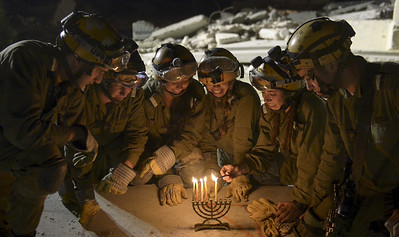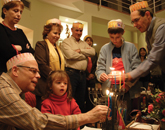×


We have detected your country as:
Please click here to go to the USA website or select another country from the dropdown list.
by: Rev. Cheryl Hauer, International Development Director
Today, Mahmoud Ahmadinejad clearly states his intention to wipe the nation of Israel from the face of the earth. The leaders of Hizbullah, Hamas, and the Muslim Brotherhood are outspoken in their hatred of Israel, and “together they lay crafty plans against God’s treasured ones” (Ps. 83:3). However, it is the Lord Himself that they have set themselves against, and His Word is clear that none of these will triumph over His chosen people.
In Leviticus 23, God delineates a series of holy convocations, times when He will meet with His people. These unique holidays remind them of His love and protection, allow them to celebrate military victory, help them to remember His acts of deliverance, and encourage them that their enemies are no match for the God of Israel.
 Webster’s dictionary assigns two meanings to the word “holiday”: a holy day and a day on which one is exempt from work. All too often in today’s world, definition number two is enough to make the holiday important, regardless of its origins or significance. Holidays have become random moments in time which often mean no more than an extra day at the lake.
Webster’s dictionary assigns two meanings to the word “holiday”: a holy day and a day on which one is exempt from work. All too often in today’s world, definition number two is enough to make the holiday important, regardless of its origins or significance. Holidays have become random moments in time which often mean no more than an extra day at the lake.
Unlike the festival cycle established by God and celebrated by the Jewish people, holidays have not had a connecting or unifying effect on society, and certainly not on Christianity. For most Christians, there is a clear distinction between the secular holiday and the religious; some Christians celebrate both, while some celebrate only the religious. Conversely, some Christians object to the pagan origins of certain religious holidays, so they celebrate only the secular ones. And some Christians have washed their hands of the whole thing, celebrating nothing but an occasional wedding or funeral.
To the ancient Hebrew, however, no such distinctions existed. Life was an integrated whole with no concept of the secular versus the religious or the temporal versus the spiritual. His life, his community, and his God were one synergistic unit, and the festival cycle was a part of it—an on-going celebration of the covenant relationship that defined him. This cycle helped to mold the very foundations of the Jewish nation. Throughout history, these holidays would provide the continuity necessary for the survival of the Jewish people as they were dispersed throughout the world.
For the Jewish people today, there are some additional markers in that cycle, days not commanded in Leviticus 23 but added to insure that the full story of their history is told, uniting past with present and future for each succeeding generation. One of those additional holidays is Hanukkah.

Photo: Israel Images
Also known as the Festival of Lights and Feast of Dedication, Hanukkah celebrates the triumph of the Jewish people over their oppressors, a miraculous military victory in 165 BC. The holiday also acknowledges the miracle of the oil, when one day’s supply burned brightly for eight days while more oil was consecrated for the rededication of the Temple. Some rabbis have suggested that the most important person in the story remains nameless: the priest who had the foresight to hide that cruse of oil or perhaps the individual who had the faith to light it once it was found.
Throughout history, Jews worldwide have lit the hanukkiah (eight-branched candelabra), eaten foods fried in oil, given gifts, and sung songs celebrating the few who secured freedom for the many and the faithfulness of God to make sure that the light He had kindled through the descendants of Abraham, Isaac, and Jacob was not extinguished.
A survivor of Bergen-Belsen concentration camp tells the story of a selection which took place on the eve of Hanukkah. Throughout the day, hundreds of men were randomly pulled from their barracks, tortured, and killed. Their cries filled the air as each hour passed. Then evening came—time to light the candles acknowledging God’s faithfulness. A wooden shoe became the hanukkiah, strings pulled from uniforms became the wicks, and black camp shoe polish became the oil. The light was lit, and standing but a few feet from heaps of bodies, an imprisoned rabbi sang the blessing: “Blessed art Thou, O Lord our God, King of the Universe, Who has kept us alive and has preserved us and enabled us to reach this season.”
Later, the rabbi related that he struggled momentarily with the decision to say such words in the midst of horror and death. But in that instant, he saw a throng of Jews—living and dead, old and young, all with faith and devotion on their faces, all who had witnessed in one way or another the death of their fathers, brothers, sons, and daughters, all who had faced persecution and terror. Despite all of that, light shone from the countenance of each one as they joined their voices with his, blessing the God “Who wrought miracles for our fathers in days of old, at this season.”

Photo: Israel Images
This Hanukkah, Jews all over the world will relight those lights and recite those same blessings. In so doing, they will unite themselves with the past, acknowledge the faithfulness of God in the present, and proclaim their belief that their future is secure, despite the intentions of enemies that continue to cry, “Let the name of Israel be remembered no more” (Ps. 83:4).
All logos and trademarks in this site are property of their respective owner. All other materials are property of Bridges for Peace. Copyright © 2025.
Website Site Design by J-Town Internet Services Ltd. - Based in Jerusalem and Serving the World.